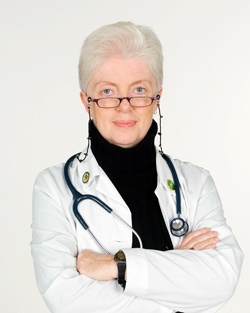
Dr. Joann N. Bodurtha is a Professor of Pediatrics and Oncology at the Johns Hopkins University School of Medicine and a medical geneticist in the McKusick-Nathans Institute of Genetic Medicine. She is also a Professor in the Department of Health, Behavior, and Society in the Bloomberg School of Public Health. Prior to 2011, she had been at Virginia Commonwealth University for 28 years where she was a Professor of Human and Molecular Genetics with joint faculty appointments in the Departments of Pediatrics, Obstetrics-Gynecology, and Epidemiology and Community Health. She graduated from Swarthmore College with a biology degree in 1974 and later served on the Swarthmore College Board of Managers from 1980-1984. She received a Luce Foundation scholarship and studied at the Nagasaki University School of Medicine with Dr. Masahiko Koike in 1976-1977. She received her MD and MPH with Honors from Yale University in 1979 and completed a pediatrics residency at Children’s Hospital of Philadelphia in 1982. She worked as a USPHS physician on the Turtle Mountain Chippewa Reservation in North Dakota with her husband Dr. Tom Smith from 1982-84. She completed a medical genetics fellowship in VCU’s Department of Human Genetics in 1984 and is board-certified in pediatrics and medical genetics. She continues to see genetic patients of all ages in the Harriet Lane clinic and is an in-hospital pediatric attending in the Bloomberg Children’s Center at Johns Hopkins.
Dr. Bodurtha led the formation of the Masters in Genetic Counseling program at VCU in 1990 and the VaLEND (Leadership Education in Neurodevelopmental Disabilities) program in 1995. Over 200 trainees have completed these programs. She served on the American Academy of Pediatrics Committee on Native American Child Health for ten years, and was recognized as the team leader for a number of awards, including Richmond YMCA Woman of the Year in Science and Medicine in 1997, the first recipient of the VCU School of Medicine’s now annual Innovation in Teaching award in 1999, the Virginia Breast Cancer Foundation Professional Achievement award, a State Council of Higher Education Outstanding Teacher for Virginia in 2006, the Genetic Alliance’s Art of Listening Award in 2008, and the Association of University Centers on Disabilities Professional Achievement Award in 2009. She served as President of the WISDM (Women in Science, Dentistry, and Medicine) organization at VCU from 2000-2003. She was director of the VaLEND program for seventeen years, co-director of the BIRCWH (Building Interdisciplinary Research Careers in Women’s Health) program for seven years, chair of the Statewide Genetics Advisory Committee for 10 years, and vice chair of the Chickahominy Health Advisory Board.
She has written over one hundred scientific articles, book chapters, and reviews and has received funding from NIH, the CDC, the Komen Foundation, the March of Dimes, the Maternal Child Health Bureau of the Department of Health and Human Services, the Urban Health Institute, and other organizations. Her research is focused on communication in cancer risk across the lifespan, understanding barriers to care for children and families with genetic conditions and improvement in understanding of genetic conditions. She has most recently focused on issues of family history and DNA banking in palliative care, and international issues in end-of-life communication in pediatrics with presentations in Libya, Turkey, and Oman.
She is currently co-director of NYMAC, the regional newborn screening and genetics collaborative, a member of the Genetics in Primary Care Collaborative of the American Academy of Pediatrics, and director of the biomedical strands in the Genes to Society curriculum of the Johns Hopkins School of Medicine. Dr. Bodurtha has worked throughout her career to enhance access to genetic care across diverse populations through consumer engagement, workforce development and education, clinical care organization, direct service, and public health research.
「小児の緩和ケア―家族を中心とした関わりと倫理的問題」
要約
背景: 小児期に生命予後を限定するような疾患に罹患した場合、寿命が大幅に短くなってしまうという非現実的な事実を子供や家族につきつけることになる。子供の死は、生涯その家族に強い衝撃を与える。医療従事者やケアを提供する人々は苦痛を和らげたり人生の質を向上させるような仕事を行うわけであるが、意思決定をすることにより協働的、専門的なコミュニケーションが改善する。小児緩和ケアの新しいモデルは、家族を中心とし、包括的(悲嘆、社会的サポートやスピリチュアリティ)であり、早期からの統合したケアを包含している。症状緩和、安らぎ、コミュニケーション(言語的、非言語的)は、がんで亡くなる子供の20%のケアにおいて重大な要素である。家族はケアの場所に関係なくケアの構成単位である。
方法: 小児緩和ケアにおいて量的、経験的な研究は、倫理的な枠組みに留意して進歩してきている。症状緩和やコミュニケーションの方法といったことが評価されている。5つの願い(The Five Wishes ®)の文書が青年期の患者で調べられており、良い親や兄弟であることや専門的なケアを提供する必要性に意味をもつことが述べられている。米国では、ヘースティングセンター1)(医療倫理の専門研究機関)が新しいガイドラインをだしている。それは、エンド・オブ・ライフ・ケアを提供する事の倫理に関わることに目を向けている。とりわけ、医療者の介入が小児のその後の人生の質においてとても重要な結果をもたらすということを十分に検討せずに、救命の試みを行うということである。
結果: 家族を含む小児の緩和ケアのゴールとは、ケアのゴールを明確にすること、子供や家族に情報に基づき選択させること、子供や家族に愛や意味をもって安心させること、そして死への準備を手助けすることである。多くの変化が病状の経緯において生じるであろう。それは、“健康そうであるという否認”のような不確かな望みや家庭内で意見が一致しないようなことに関係したものであることが多い。子供は身体的にも、行動的にも、社会的な役割においても成長し続けている。文献では、医療専門家に、信頼をおくような適切な方法で意思決定に発達段階の子供を可能な限り含むことを概ね支持している。これは、明確で正直なコミュニケーションや文書に事づいている。同意とは、子供が意思決定に参加できるようにすることを唱えており、子供の選択権を聞くということでもある。
結論: シシリー・ソンダースが、1969年に小児の致死的疾患のマネジメントにおける緩和の意図に関する記述をはじめて提唱した。小児の緩和ケアは、子供の苦悩を深く理解し、命が限られた疾患をもちながら生きるということに中心をおくものである。それは、疾患の経過を通して、ケア規範の部分的な考えとして概念化することができる。疾患をターゲットとした治療は、ホスピス/緩和ケアで記載されているようなQOLの尺度も同時に提供される。小児ではもっと長い期間かもしれない。文化は、患者や家族が、病気や診断、苦悩、そして死(dying)といったものの中から意味というものをいかにして作っていくかということを根本的に形作る。様々な医療資源は、緩和ケアの旅路(journey)を通じて、小児、家族、そして医療者を支持することに有用である。
1) The Hastings Center, founded in 1969, is an independent, non-partisan, non-profit bioethics research institute based in the United States. The center has over 180 fellows, including many physicians, attorneys, PhDs and bioethicists.
1969年にニューヨークにヘースティングセンター(医療倫理の専門研究機関)が設立され、180人以上の研究員がいて、多くの医師、弁護士、医学博士、生命倫理学者も含まれる。
(邦訳:小池和彦)










